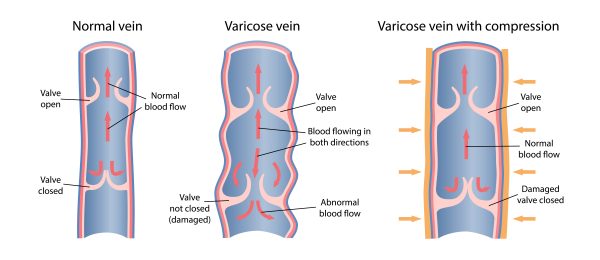Whether you have a fresh varicose vein or you’ve been dealing with them for years, treatment for varicose veins is a great way to manage the symptoms and help you maintain good vein health. Booking in a consult and undergoing medical treatment is a great option, but is it something that you do once and never have to worry about again?
If you’re overwhelmed at the thought of treatment or if you’re wondering how frequency will I need to treat my varicose veins – we’re here to help!
The importance of aftercare
Taking care of the veins after treatment is essential, especially the two weeks following a procedure. Whether you’re having sclerotherapy or endovenous laser ablation (the more effective of the two), the veins need time to properly seal and be reabsorbed by your body. While this varies from person to person, there are some standards for vein treatment aftercare that help to stop the need for further treatments down the road. These include
- 30 minutes of light walking daily.
- Wearing compression stockings (your doctor will let you know how long you should be wearing these as a minimum).
- Avoiding heavy lifting, high-impact exercise or strenuous work for the weeks following treatment.
- Following the aftercare properly can make the difference between happy healthy veins in the legs and having to return in 6 months for more treatment.
Learn more: Varicose vein treatment: what to expect
How frequently do I need to treat my varicose veins?
Once you have had your primary treatment, it’s strongly recommended to come back in for a follow up within four weeks to see how successful it was and use sclerotherapy to treat any reaming varicose veins. For the vast majority of patients, this is usually the final treatment needed.
However, when a vein is sealed and gradually absorbed by the body, there’s still a chance that other veins in the leg will develop into varicose veins. This happens in cases where the root cause (chronic venous insufficiency) is still affecting the body and putting a strain on the veins. In this case, treatment on the new veins may be required.
There is also a small chance that some of the smaller veins that branch off can reopen in the 2-3 years following, but in these cases, minor treatment usually fixes that up.
Stop varicose veins coming back
There is an old saying that an ounce of prevention is worth a pound of cure. When it comes to vein health, this is certainly worth following. Taking care of your veins isn’t just useful for reducing the risk of varicose veins, but also has wide-ranging health benefits. When choosing treatment, speak to your specialist about endovenous laser ablation or radiofrequency ablation, as it’s the most effective way of closing off the varicose vein permanently.
While varicose veins can’t be 100 per cent prevented, by changing your lifestyle you can lower the risk of veins occurring, and implementing these changes after vein treatment is a great way to sustain healthy veins in your legs.
Here are a few tips to lower your risk of varicose veins:
- Change your diet to reduce trans fats and sugars, and focus on leafy greens, berries, fresh fruit and citrus.
- Exercise regularly, especially low impact activities like swimming, cycling, walking and Yoga.
- Maintain a healthy weight, and if you’re obese or heavily overweight, speak to your GP about setting up a weight loss plan.
- Wear compression stockings if you’re seated or standing for extended periods of time.
- Avoid sedentary activity, and where possible, get up and move every 20-30 minutes if you’re stuck at the desk.
Read more: Why winter is the best time to treat varicose veins.
Seek expert advice
The doctors at The Vein Institute specialise in varicose vein treatment. We offer patients a comprehensive program using non-surgical laser treatment techniques.
The benefits of non-surgical varicose vein treatment are:
- Walk-in walk-out treatment
- 98% success rate
- Extremely effective
- Can be performed at a clinic (no hospitalisation)
- No general anaesthetic
- Medicare rebates apply
- No downtime or time away from work
Call us on 0420 102 637, or fill out our booking request form.
Read more: Should people aged 65+ treat their varicose veins?

